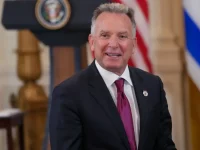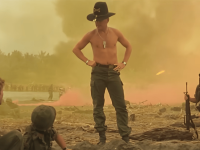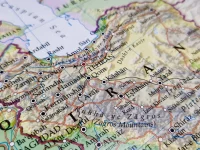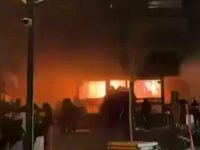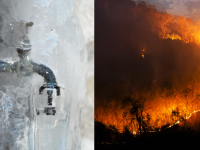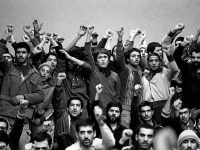Middle East. A Kurd in Cowley

HOMELAND. Cowley Road, Oxford, five in the evening. Behind the bright green walls and electric blue shutters of the Greece Greek Taverna, a Kurdish family group sits down to a modest selection of traditional meze dishes, a daily routine before the restaurant opens for business.
Though there is a well-established Kurdish community in Cowley, some members of the group have only recently arrived in the UK. Siwar, a 22-year old from Aleppo, Syria, fled his homeland three years ago at a point when the country was becoming increasingly unsafe for civilians, especially those of Kurdish descent. “It was like a video game,” he recalls. “I started seeing violence on the TV, and people started carrying guns and knives around on the streets. It was too dangerous to stay.”
Siwar first decided to move to Kobane, the hometown of his family and a Kurdish-dominated region recently liberated from ISIS, because he felt it was the only place left in the country where his ethnicity would not provoke such great persecution. “As a Kurd, for centuries we have had problems. We were forced to get out, otherwise we would be killed or massacred or put in prison. That’s typical Syria, typical Middle East.”
But even Kobane, an area that has remained under separate control from the Assad government since 2012, was not left untainted by the turmoil and unrest sweeping the country. “There were no opportunities left there, unless you wanted to carry guns and go and fight people. I thought to myself, I have to move away from this city. I don’t like it, I can’t do it, I have other things that I want to do with my life.” With help from friends, Siwar escaped over the border via illegal means to Turkey, joining the plight of several million other Syrians displaced by the ongoing violence and oppression. From here he obtained documents to travel to Greece, where he soon met a Greek girl with whom he decided on a strategic marriage that would allow him to remain there legally. But he found the new language and environment increasingly difficult, and realised he could not survive in such isolation. “I couldn’t stay because I didn’t have anything there. No family, no friends, no nothing. It wasn’t easy for me. But because I had a Syrian passport I was not allowed to move.”
Some months later Siwar befriended a man offering to provide him with a forged ID and organised route to Paris, for a 6000 euro charge. “I was told, a guy will come and get you at the airport in Paris, pick you up, show you round, everything. It was my only option. So when I arrived at the airport I waited, but nobody came. I had given 6000 euros to a liar. My family and my friends were at home, they couldn’t do anything. I had no one.”
After a two month period of liminal existence spent between various French cities, Siwar made his way to Calais where he eventually found a truck driver willing to run the risk of smuggling him over the border into England. He hides a rather bashful grin. “It was very frightening, I did not know whether I would make it. But I did.”
Siwar prefers not to dwell on the perils of his journey out of Syria, however, telling it as a matter-of-fact story rather than a dramatic narrative. “The past is past now, it’s gone and there’s no point thinking about it anymore.” He resists laying blame and is still ceaselessly appreciative of the more settled life he has found in Oxford, where he has signed up for an English language course in the hope of being able to continue his university studies in the UK. His two uncles come to join us at the table, both of whom left Syria a much longer time ago. Typically Kurdish hospitality accompanies the food. “You’re not eating anything!” They complain after I have finished off enough for two. “Come on, eat! Be a Kurd!”
The emergence of Kurdish fighters as the group with the greatest capacity to contain IS has again brought to attention the position of this embattled minority who are spread throughout the Middle East. Kurds have long experienced severe persecution from governments in the region; the most famous single instance of Kurdish persecution being the Halabja genocide in Iraq in 1988. Kurds were long barred from being educated in their own language in Turkey, Iraq and Syria (in which printing material in Kurdish is still forbidden). There is currently a semi-autonomous province of Iraq held by Kurds, but many continue to fight for a fully independent state.
Mustafa, the younger is a determined campaigner for Kurdish independence and for western support in Syria. His charisma and charm, accompanied by emphatic hand gestures when he speaks, add to the aura of a tireless activist. He shares moving experiences of growing up a Kurd in Assad’s Arab-dominated Syria. “Can you imagine not being able to practise your language, your culture, in your own country? Not being able to practice your rights? We were born in Syria, our grandparents were born in Syria, it’s our home, but we never had any rights as Kurds, we couldn’t be active there. We have never been home.”
Mustafa talks extensively about his work campaigning for the British government to support the Kurds in Syria, and about the prospect and utility of western intervention. I asked what he thought of the UK government’s vote, in August 2013, not to intervene militarily in the country.
“We don’t need military intervention! If they support the Kurdish movement, then we don’t need troops on the ground. We, the Kurds, can fight them. We have people, we have resources, we have the ground there. We are more…” He searches for a polite way to phrase this. “More knowledgeable. We know more about our own town than the US or the UK does. So it’s easier for us to fight than to bring other western people in to go and die without even knowing who’s who. We don’t want you guys to die on our behalf. But we do need support. And we will keep asking until we get it.”
The West’s post-Iraq response to humanitarian crises seems now to be primarily in the form of aid. A simpler option for Britain, perhaps, but not for Syria. “Aid doesn’t work!” Insists Mustafa, motioning angrily, his hand full of flat bread and hummus. “Over the years the aid money from Europe just went towards weapons for different groups. First aid and charity organisations have become like a business in the Middle East – the groups take it and sell it on to make money. Anyway, who should they give it to? The Free Syrian Army has collapsed now, they don’t exist anymore. There’s just the militant factional groups that came out of them. All we are asking for is for education, training, not for weapons. Because if you support us now, we can do something together, we can clean up the mess that you guys made, or that whoever made.”
Mustafa diverts the conversation briefly to tell me about the strands of salted cheese we are eating, a Kurdish special. “When it’s fresh, without salt, they warm it in hot water, then they pull it out into strings like this and make it like hair. My mother used to do it, and my grandmother. And there’s still a Kurdish community here in Oxford who makes it.” The meal continues as Turkish guitar music provides a soft backdrop to our conversation.
“The Kurds are the ones protecting the minorities in the Middle East at the moment – Christians, Arabs, everyone. We are the only ones who are really able to stand up and fight ISIS. They may be out of Kobane but they’re not very far away. They can come back again anytime, and they will. The West needs us. Of course the UK won’t support a Kurdish state though, because then they would have to do this for the Palestinians as well. So it will be very hard to get the West to agree on an independent Kurdistan, because Turkey is in NATO, and Turkey doesn’t want a separate Kurdish state. Naturally, they’re too self-interested.”
I ask tentatively what his hopes are for an independent Kurdistan, if it will ever come into being. “It’s gonna happen!” He replies with conviction, “Whether the West wants it or not, it’s gonna happen. The Kurds are never going to go back where they used to come from. This is our time.”
Frances Timberlake


